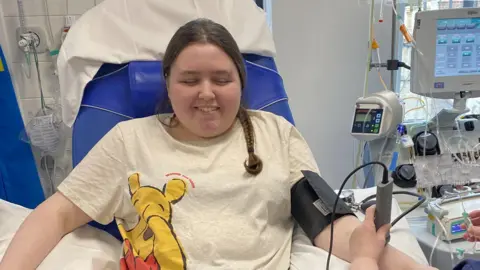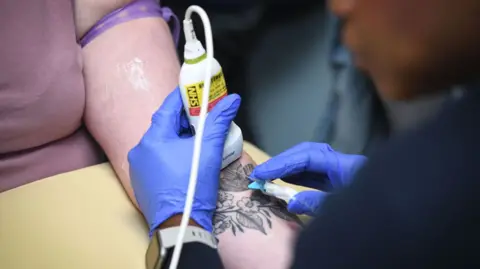NHS cannula method rolled out after city success
 NHSBT
NHSBTAn ultrasound service which means fewer patients need surgery has been rolled out to eight NHS units after its success in Bristol.
NHS Blood and Transplant (NHSBT) said its unit in the Bristol Haematology and Oncology Centre used ultrasound-guided cannulation 177 times for patients or donors in an eight-month period.
A nurse uses an ultrasound machine to find a vein which cannot normally be found, it said. The procedure is used for people with illnesses including blood cancers and sickle cell disease.
Medics added it helped avoid "multiple attempts at cannulation", the need to go into theatre for central line insertions and removals and reduced patients' time in hospital.
 NHSBT
NHSBTThe NHSBT said since the training began at its Bristol Therapeutic Apheresis Services (TAS) unit two years ago, it is thought more than 200 central line procedures had been avoided.
And the method has now been rolled out to eight other TAS units in England.
"Bristol is one of our busiest units and yet had the lowest rate of central line insertions thanks to this method," said Teresa Baines, Head of TAS at NHSBT.
"A lot of our patients come to us for regular treatments and so to be able to avoid multiple attempts at cannulation or being taken to surgery for line insertion (and later removal) on every visit, makes a huge difference to the quality of their care."
The NHSBT said the procedure could save patients up to half-a-day in hospital and also saves the NHS money.
'Much better experience'
Tegan Rendell, 20, attends Bristol's TAS unit every eight weeks, for a plasma exchange to treat Autoimmune Limbic Encephalitis, an autoimmune disease that attacks her brain.
"My illness mean I need to undergo a lot of medical procedures and it can be really traumatic as my veins are so difficult to find," she said.
"There have been occasions where medics have tried to cannulate nine times and still not been successful, it's awful.
"My arms end up black and blue and really sore.
She said the plasma exchanges were "life-changing" and each time improved her quality of life.
"I have fewer seizures, less headaches and generally feel so much better within myself.
Even so, if I knew I faced the trauma of repeated cannulation attempts every time I needed a plasma exchange, I would really struggle.
But ultrasound guided cannulation – and the incredible nurses who do it – make my experience so much better than it might otherwise be."
Follow BBC Bristol on Facebook, X and Instagram. Send your story ideas to us on email or via WhatsApp on 0800 313 4630.
